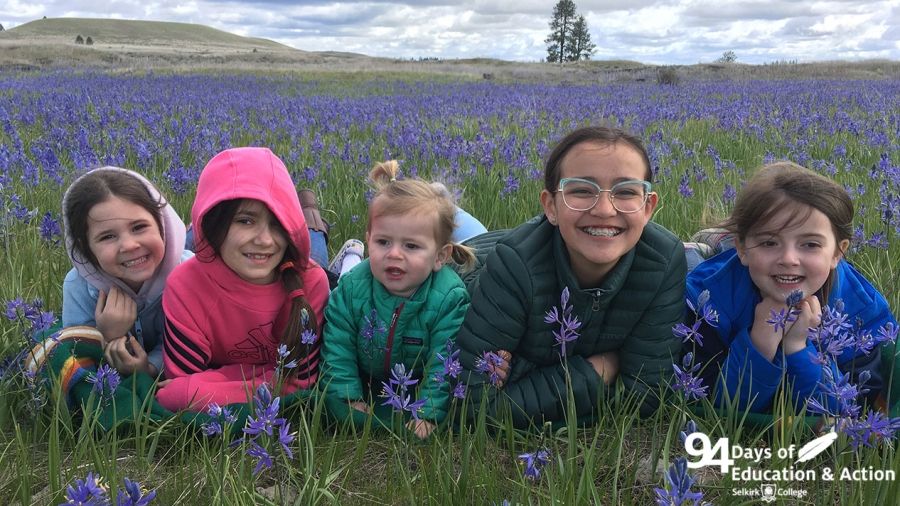
Language is the heartbeat of culture, and a new Colville-Okanagan Salish beginners’ course being offered at Selkirk College puts focus on strengthening understanding for both Indigenous Peoples and all those interested in deeper insight.
The Beginners n̓syilxčn̓ 1 (pronounced in-seel-h-chin) course will be offered for the first time this September on the Castlegar Campus. In partnership with the Salish School of Spokane, the three-credit university transfer course is designed to encourage students to develop speaking, listening, reading and writing skills.
Considered a highly endangered Indigenous language, the n̓syilxčn̓ 1 curriculum has been designed by Sinixt language activist LaRae Wiley and her husband Christopher Parkin after years of work with first-language speaker Elders in Canada and the United States. Founders of the Salish School of Spokane, the couple’s efforts to revitalize n̓syilxčn̓ through language immersion for students from Kindergarten to Grade 6 has helped make significant strides in preserving a vital component of the culture.
“For me, language is important because it’s the foundation of your identity,” says Wiley, who achieved fluency in n̓syilxčn̓ as a second-language learner in midlife. “If you have a strong identity, then you have the ability to navigate life a lot easier because you have knowledge and awareness transcendentally of who you are and where you come from. It changes your perspective of who you are in the world.”
When their children went off to college in 2005, Wiley and Parkin sold their house in Spokane so they could come to southern British Columbia for two intense years of learning the language from Similkameen Elder Sʕamtíc̓aʔ (Sarah) Peterson. With Sʕamtíc̓aʔ, they developed a fluency transfer system and curriculum that formed the foundation of their work at Salish School of Spokane where they have been working with their staff of teachers—including their son Grahm Wiley-Camacho—since 2010.
There are now 20 advanced fluent apprentice n̓syilxčn̓ speakers in Canada and the United States who have gained their knowledge as second-language learners. Though the language is still critically endangered, there are presently nearly as many advanced fluent apprentice speakers as there are surviving first-language Elder speakers.
Taking Action on Truth & Reconciliation
“The Sinixt people have been ethnically cleansed from Canada and subject to genocide, so if there is to be truth and reconciliation in that brutal history, the Sinixt people, the Sinixt culture and the Sinixt language need to be restored to the land in a good and beautiful way,” says Parkin, the principal at the Salish School of Spokane. “We work to deliver this in a way that is about building a future together, not recriminations and guilt in the past. In a future that is built on the truth, everybody can be reconciled to the true history and be part of a beautiful future for all our kids, grandkids and great grandkids.”
For several years, Wiley and Parkin have been working with the team of Nation instructors who lead Selkirk College’s Regional Indigenous Perspectives on Languages & Cultures course that is offered throughout the year. Having also taught n̓syilxčn̓ 1 at the post-secondary level in Spokane, taking the language element of the Perspectives course to the next level is a welcome addition to the offerings at the Castlegar Campus.
“This is such an important step for the college to support self-determination and language revitalization,” says Dianne Biin, Selkirk College’s Director of Indigenous Education & Engagement. “The Truth and Reconciliation Commission’s calls to action point to post-secondary institutions for playing a key role in the revitalization of Indigenous languages. Having an opportunity to offer n̓syilxčn̓ 1 at this moment will help us build on even more essential work in the future and supports the goals of Indigenous education across the province.”
For the first time at the college, Indigenous students who enrol can receive the course at no cost. This waiver supports Indigenous learners to connect with culture and be supported in their pathways.
The course is not only for Indigenous students, it is open to all learners with an interest and respect for the Salish language and culture. Wiley, Parkin and Wiley-Camacho will be the lead instructors of n̓syilxčn̓ 1, which will be delivered in person on Saturdays starting in September 2023.
Like any first-year post-secondary language course, students can expect learning n̓syilxčn̓ to be academically rigorous. Learners who enter the course with a thirst for building on their own culture or understanding more about the traditional language of the region will be rewarded for their efforts.
“It’s a wonderful opportunity to build community because learning Salish is fun,” says Wiley. “It’s deep and rich, but our curriculum is meant to be enjoyable where it’s ultimately about learning to speak to each other.”
Though n̓syilxčn̓ 1 has been delivered at other post-secondary institutions in the past, this is the first time it has been offered at Selkirk College.
“This is an important step in creating a beautiful relationship with people in that region,” says Wiley. “The language is still highly endangered and we need to create new speakers. We are doing everything we can to change the story.”
If you are an Indigenous student and want to apply, please connect with Counsellor for Indigenous Students, Danica Weager, for further information and the tuition waiver process.
The Beginners n̓syilxčn̓ 1 course is being offered through Open Studies, which means you do not need to be registered in an existing Selkirk College program to enrol.
Learn more about the course and how to register for Open Studies.
Sustainable Development Goal (SDG) #10: Reduce inequality within and among countries
Sustainable Development Goal (SDG) #16: Promote peaceful and inclusive societies for sustainable development, provide access to justice for all and build effective, accountable and inclusive institutions at all levels
Sustainable Development Goal (SDG) #4: Ensure inclusive and equitable quality education and promote lifelong learning opportunities for all




